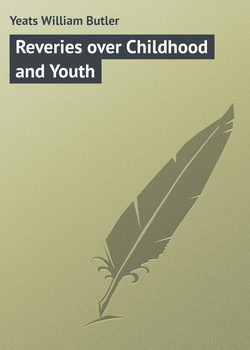Reveries over Childhood and Youth

Реклама. ООО «ЛитРес», ИНН: 7719571260.
Оглавление
William Butler Yeats. Reveries over Childhood and Youth
REVERIES OVER CHILDHOOD AND YOUTH
II
III
IV
V
VI
VII
VIII
IX
X
XI
XII
XIII
XIV
XV
XVI
XVII
XVIII
XIX
XX
XXI
XXII
XXIII
XXIV
XXV
XXVI
XXVII
XXVIII
XXIX
XXX
XXXI
XXXII
XXXIII
Отрывок из книги
My first memories are fragmentary and isolated and contemporaneous, as though one remembered vaguely some early day of the Seven Days. It seems as if time had not yet been created, for all are connected with emotion and place and without sequence.
I remember sitting upon somebody’s knee, looking out of a window at a wall covered with cracked and falling plaster, but what wall I do not remember, and being told that some relation once lived there. I am looking out of another window in London. It is at Fitzroy Road. Some boys are playing in the road and among them a boy in uniform, a telegraph boy perhaps. When I ask who the boy is, a servant tells me that he is going to blow the town up, and I go to sleep in terror.
.....
Yet for all my admiration and alarm, neither I nor anyone else thought it wrong to outwit his violence or his rigour; and his lack of suspicion and a certain helplessness made that easy while it stirred our affection. When I must have been still a very little boy, seven or eight years old perhaps, an uncle called me out of bed one night, to ride the five or six miles to Rosses Point to borrow a railway-pass from a cousin. My grandfather had one, but thought it dishonest to let another use it, but the cousin was not so particular. I was let out through a gate that opened upon a little lane beside the garden away from ear-shot of the house, and rode delighted through the moonlight, and awoke my cousin in the small hours by tapping on his window with a whip. I was home again by two or three in the morning and found the coachman waiting in the little lane. My grandfather would not have thought such an adventure possible, for every night at eight he believed that the stable-yard was locked, and he knew that he was brought the key. Some servant had once got into trouble at night and so he had arranged that they should all be locked in. He never knew, what everybody else in the house knew, that for all the ceremonious bringing of the key the gate was never locked.
Even to-day when I read “King Lear” his image is always before me and I often wonder if the delight in passionate men in my plays and in my poetry is more than his memory. He must have been ignorant, though I could not judge him in my childhood, for he had run away to sea when a boy, “gone to sea through the hawse-hole” as he phrased it, and I can but remember him with two books – his Bible and Falconer’s “Shipwreck,” a little green-covered book that lay always upon his table; he belonged to some younger branch of an old Cornish family. His father had been in the Army, had retired to become an owner of sailing ships, and an engraving of some old family place my grandfather thought should have been his hung next a painted coat of arms in the little back parlour. His mother had been a Wexford woman, and there was a tradition that his family had been linked with Ireland for generations and once had their share in the old Spanish trade with Galway. He had a good deal of pride and disliked his neighbours, whereas his wife, a Middleton, was gentle and patient and did many charities in the little back parlour among frieze coats and shawled heads, and every night when she saw him asleep went the round of the house alone with a candle to make certain there was no burglar in danger of the hatchet. She was a true lover of her garden and before the care of her house had grown upon her, would choose some favourite among her flowers and copy it upon rice-paper. I saw some of her handiwork the other day and I wondered at the delicacy of form and colour and at a handling that may have needed a magnifying glass it was so minute. I can remember no other pictures but the Chinese paintings, and some coloured prints of battles in the Crimea upon the wall of a passage, and the painting of a ship at the passage end darkened by time.
.....